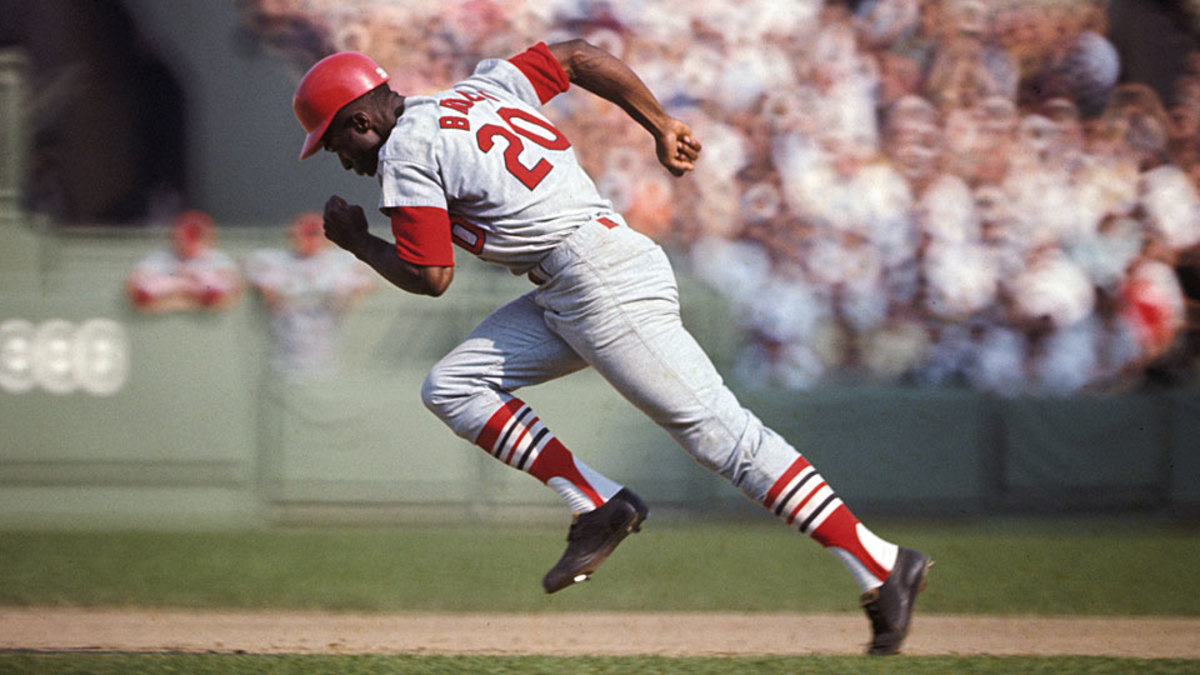SI Vault: Lou Brock explains how he became a master thief on the bases
This article originally ran as the cover story of the July 22, 1974 issue of SPORTS ILLUSTRATED. To subscribe to SI, click here.
There is, says the poised-to-dash ballplayer at right, only one sure way to keep him from doing the thing at which he is the best in the world: "Don't let me reach first base." As grim pitchers and grimmer catchers know all too well, once Lou Brock of the St. Louis Cardinals does get on—by way of a single, a base on balls, an error, being hit by a pitch or, as happened in one game, catcher's interference, he isn't choosy—he will either steal second or drive the battery bananas with his antics around first. At 35, the Cardinal leftfielder might seem somewhat old for such mischief, but 1974 is vintage Brock. So far he has stolen 56 bases in 64 attempts, which puts him some 22 games ahead of the pace of Maury Wills of the Los Angeles Dodgers in 1962, the year he established one of baseball's most impressive records by stealing 104 times, breaking the old mark by eight. Brock's feats on the base paths, plus his .307 batting average, are a major reason why the Cardinals are in the thick of the race in their division.
Brock's antipathy toward first base might be traced to the fact that it is the only one he cannot steal. "First base is nowhere," he says. "And most times it is useless to stay there. On the other hand, second base is probably the safest place on the field. When I steal second, I practically eliminate the double play, and I can score on almost any ball hit past the infield. Third? The ball club doesn't want me to steal third unless the situation is critical." (This alone may prevent Brock from breaking Wills' record. Wills stole third 16 times in 1962.)
So far Brock has stolen second 53 times in 60 attempts and third three times in four attempts. In addition: 1)Brock has scored a run after 29 of his 56 steals; 2) he has stolen 28 bases on the road; 3) he has gone 37 for 43 against righthanded pitchers and a superb 19 for 21 against lefthanders, who have the advantage of staring straight at him as he leads off first; 4) on 11 occasions he stole two bases against the same pitcher in the same game; and 5) he has stolen a perfect 18 for 18 on base paths with artificial turf and dirt sliding pits. "I get better starting traction on turf than dirt," he explains.
Hall of Fame OF Lou Brock loses part of leg to infection
On a recent morning Brock sat on a bench in the right-field corner of San Francisco's Candlestick Park. "Hey, Brock," yelled St. Louis Pitcher Bob Gibson, "do some work like the rest of us." Brock grinned. "What do you think I'm doing now?" he shouted. Brock was looking not at Gibson but at the Giant pitchers throwing batting practice. "My academics," he explained.
Brock studies well. Doug Konieczny, a rookie pitcher who started the season with the Houston Astros, says he was amazed that Brock had the gall to steal second on the very first pitch he made to the next hitter in the St. Louis lineup, Second Baseman Ted Sizemore. "I figured Brockwould at least wait to see my pickoff motion and my delivery a few times," Konieczny says. "I saw them both during batting practice," says Brock. Another rookie pitcher, Dave Freisleben of the San Diego Padres, received the same disdainful treatment. On Freisleben's second pitch in his first appearance against St. Louis, Brockhit a sharp single. On Freisleben's third pitch Brock stole second base. He also stole second later in the same game against Freisleben and then—to keep the rookie thinking—stole two bases against him in their next meeting, both in the same inning.
Like most expert base thieves, Brock says he steals on the pitcher, not the catcher. But this is not to suggest he ignores the catcher. "For years Jerry Grote of the Mets presented me with a lot of problems," Brock says. "Grote's quick out of the box, has a powerful arm and always seemed to have a sixth sense about my stealing. He would have the ball waiting for me at second base long before I got there." Consequently Brock rarely tried to steal against the Mets when Grote was behind the plate. "Then one day Grote walked past me before a game and I said hello to him,"Brock continues. "Well, Grote didn't hear me or he was ignoring me, I didn't know which. So I said hello a second time. Again he either didn't hear me or he was ignoring me. So I screamed at him. 'Hello Grote!' That bothered him, and he was upset when I came to bat. I got on and began screaming again. 'Grote! Grote! Grote!' He wanted me to go, of course. So I went. And I finally beat him. Since that day I've run at about a 90% efficiency against him."
The pitchers? "The most important thing about base stealing is not the stealing of the base," Brock says, "but disturbing the pitcher's concentration. If I can do that, then the hitter will get a better pitch to swing at and I will get a better chance to steal." Brock has fine rapport with Ted Sizemore, who normally hits behind him. Sizemore was at bat during 32 of Brock's first 40 steals. "We're a unit," says Brock, "just as much as the pitcher and the catcher are a team. What bothers me is that Teddy might swing and miss on purpose so often to distract the catcher that he could get into the habit of swinging and missing."
When Brock is at first he does not look to the Cardinal coaches for signs. "I don't have time," he says. "I'm involved with my own strategy. I run the bases the way I hit. I try to tap in on the pitcher's thinking to be aware of how he is setting up the hitter—whether the situation calls for a strike, for example, or a curveball in the dirt."
End Of The Glorious Ordeal: The night Hank Aaron passed Babe Ruth
"Establishing an association with first base is essential," he says. "You can't watch the pitcher and keep looking back to the base. You never beat a pitcher by guessing where you are. This is a precise business, with no place for error." On artificial infields Brock sets the base-path edge of the rug as the point of his maximum lead. On natural infields he kicks an indentation with his spikes before the game and uses that as a marker. So he knows what he needs to know. And then he goes about establishing variations on his theme. "I have a decided advantage over the pitcher," Brock says, "because I can change my stealing technique, but a pitcher's motion is mechanical. He cannot alter it without risking injury to his arm. By using varying lengths and styles of leads and takeoffs, I minimize detection of my plans." At times Brock stands four or five steps off the base and rests his hands against his knees. At times he takes the same lead but puts his hands on his hips. Occasionally he fakes a takeoff for second. Sometimes he stands motionless on the base path, trying to lure the pitcher into a false sense of security. And he might stand oh-so-casually on the base itself. "All this time," he says, "I'm getting ready to make my move."
• Read 60 of the best pieces in SI history, plus learn the story behind the stories
Pitchers have moves of their own, of course, and Brock has classified them. "All pitchers fall into four broad categories," he says. "The anatomy of their bodies dictates what moves they have to make. I rate moves as fast, quick, moderate and slow. Believe it or not, you can be slow and quick. Add their tendencies to that, and, well, that's pretty much all there is to know."
That's all? "It has been years of practice and torture for me," Brock says. "I know now what I can do and what I can't do. As a young runner I used to gamble a lot. Now I go with my bread and butter. Through the years I've made adjustments, and so have the pitchers. After readjusting, some have stopped me cold. But I'm not stupid. I change."
There are, says Brock, several pitchers he cannot run against. "A few don't let me get on base," he says, "so I never can steal against them. Then there are enigmas like Jim Barr of the Giants and Don Gullett of the Reds. I can't analyze Barr's style and put it back together, so I don't steal on him." Brock says Gullett contains him because he doesn't do the unexpected. "Gullett never throws over to first, but in the back of my mind I always expect him to, so I stay close against him and don't try much." His record against Gullett this year is 0 for 0.
The rule book says the distance between first and second is 90 feet. But that is a false standard. "What it really is," says Brock, "is 13 steps. When I came up with the Cubs in 1961 my manager, Lou Klein, told me that, and I didn't believe him. I was a math major in college, and I was positive he was wrong. But it was 13 steps that day—and it has been 13 steps every day since." When he leaves first Brock moves his left foot over his right—"that's automatic"—and 13 steps later he is sliding into second. "I stay up as long as possible and make my slide as short as possible," he says. "I don't steal the base as much as I take it. To me the word steal contains the element of surprise and I don't surprise anyone when I head for second base. The other clubs would be surprised if I didn't."
Can Brock break Wills' record? Brock has his doubts. He is ahead of Wills' pace, but Wills stole 56 bases in his last 66 games. Then there is the matter of late-season wear and tear. Although he wore special sliding pads, the pain of the pounding kept Wills awake at night. Maury himself muses, "Even though Lou says he doesn't think he'll break the record, I think he's just being coy. He's clever enough to know that might make a pitcher or catcher relax for an instant."
At present Brock ranks No. 5 on the game's list of all-time base stealers, trailing, in order, Ty Cobb, Eddie Collins, Max Carey and Honus Wagner. Through 12 full seasons Brock has averaged 53 stolen bases a year, far more than any modern player. And now, in mid-July, he has already surpassed that figure. Shouldn't he be slowing down instead of speeding up at the age of 35?
"I may be one step slower nowadays,"Brock says, "but I think I'm still one step ahead of the crowd."




































